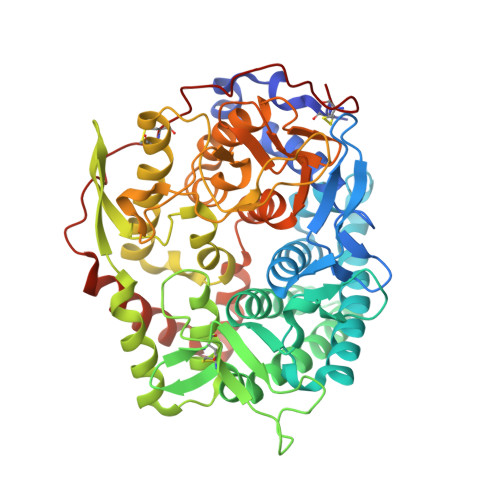Identification, characterization, and structural analyses of a fungal endo-beta-1,2-glucanase reveal a new glycoside hydrolase family.
Tanaka, N., Nakajima, M., Narukawa-Nara, M., Matsunaga, H., Kamisuki, S., Aramasa, H., Takahashi, Y., Sugimoto, N., Abe, K., Terada, T., Miyanaga, A., Yamashita, T., Sugawara, F., Kamakura, T., Komba, S., Nakai, H., Taguchi, H.(2019) J Biol Chem 294: 7942-7965
- PubMed: 30926603
- DOI: https://doi.org/10.1074/jbc.RA118.007087
- Primary Citation of Related Structures:
6IMU, 6IMV, 6IMW - PubMed Abstract:
endo -β-1,2-Glucanase (SGL) is an enzyme that hydrolyzes β-1,2-glucans, which play important physiological roles in some bacteria as a cyclic form. To date, no eukaryotic SGL has been identified. We purified an SGL from Talaromyces funiculosus ( Tf SGL), a soil fungus, to homogeneity and then cloned the complementary DNA encoding the enzyme. Tf SGL shows no significant sequence similarity to any known glycoside hydrolase (GH) families, but shows significant similarity to certain eukaryotic proteins with unknown functions. The recombinant Tf SGL ( Tf SGLr) specifically hydrolyzed linear and cyclic β-1,2-glucans to sophorose (Glc-β-1,2-Glc) as a main product. Tf SGLr hydrolyzed reducing-end-modified β-1,2-gluco-oligosaccharides to release a sophoroside with the modified moiety. These results indicate that Tf SGL is an endo -type enzyme that preferably releases sophorose from the reducing end of substrates. Stereochemical analysis demonstrated that Tf SGL is an inverting enzyme. The overall structure of Tf SGLr includes an (α/α) 6 toroid fold. The substrate-binding mode was revealed by the structure of a Michaelis complex of an inactive Tf SGLr mutant with a β-1,2-glucoheptasaccharide. Mutational analysis and action pattern analysis of β-1,2-gluco-oligosaccharide derivatives revealed an unprecedented catalytic mechanism for substrate hydrolysis. Glu-262 (general acid) indirectly protonates the anomeric oxygen at subsite -1 via the 3-hydroxy group of the Glc moiety at subsite +2, and Asp-446 (general base) activates the nucleophilic water via another water. Tf SGLr is apparently different from a GH144 SGL in the reaction and substrate recognition mechanism based on structural comparison. Overall, we propose that Tf SGL and closely-related enzymes can be classified into a new family, GH162.
Organizational Affiliation:
From the Department of Applied Biological Science, Faculty of Science and Technology, Tokyo University of Science, 2641 Yamazaki, Noda, Chiba 278-8510.


















